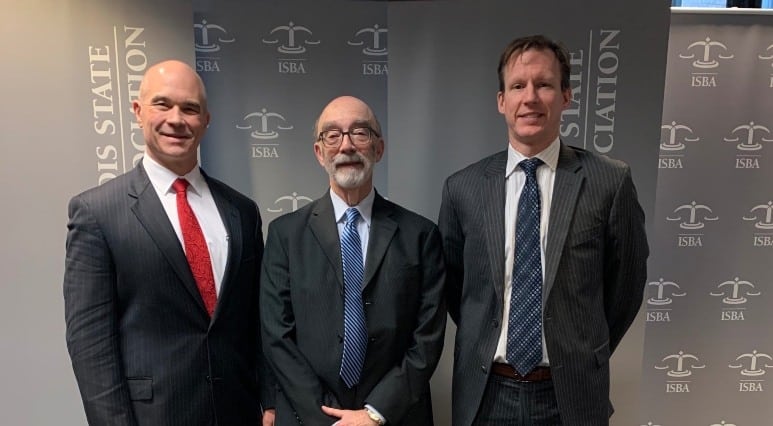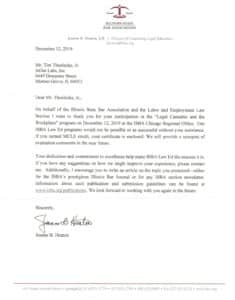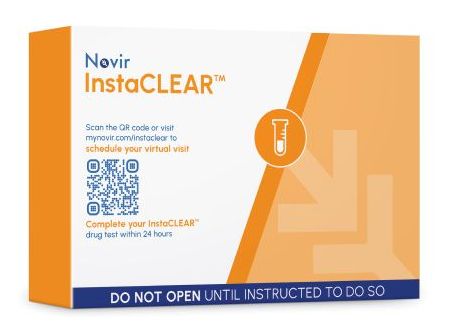InOut Labs President Joins ISBA Program
Chicago, IL – December 13, 2019 — Tim Thoelecke, president of InOut Labs, served as one of two featured presenters at the Illinois State Bar Association (ISBA) program, “Legal Cannabis and the Workplace,” on December 12. ISBA hosted the event as part of its new Cannabis Law Section, focusing on the impact of the Illinois Recreational Marijuana Law on workplaces. A recorded version is available on the organization’s website.
Attorneys Earn CLE Credits
Attorneys who attended the two-hour live webcast earned 2.0 Continuing Legal Education (CLE) units. Alan M. Kaplan, Principal at Masuda, Funai, Eifert & Mitchell, Ltd., coordinated the program and attended the session.
 Presentations on Cannabis Laws and Workplace Impact
Presentations on Cannabis Laws and Workplace Impact
Participants viewed presentations from Brian Dougherty, a partner at Goldstine, Skrodzki, Russian, Nemec, and Hoff, Ltd., and Tim Thoelecke.
- Dougherty covered complex legal challenges for employers, including the Cannabis Regulation and Tax Act (CRTA), the Compassionate Use of Medical Cannabis Program Act, and the Right to Privacy in the Workplace Act.
- Thoelecke explained how drug testing works, focusing on marijuana impairment and workplace safety risks.
Illinois Recreational Marijuana Law Becomes Effective
Recreational marijuana became legal in Illinois in January 2020.
“Employers must provide a safe workplace,” says Thoelecke. “Maintaining a drug-free workplace is a crucial safety measure.”
Changes in Employer Protections
Initially, the Illinois recreational marijuana law offered little protection for employers. The Right to Privacy in the Workplace Act was later modified to protect all off-duty legal behavior, including marijuana use. The law defines “legal” based on state law.
Because cannabis remains a Schedule I drug under federal law, most states with legal marijuana allow employers to follow federal regulations when making employment decisions based on positive drug tests. Many states also include a “safety carve-out”, permitting drug testing for employees in safety-sensitive roles.
Workplace Drug Testing and Legal Opinions
Thoelecke published a blog post discussing workplace marijuana testing and included attorneys’ legal opinions to clarify common concerns.
Amendment to the Law and Employer Responses
A week before the webcast, Illinois Governor J.B. Pritzker signed an amendment allowing employers to continue testing for marijuana as before.
“Most of our clients are not changing their drug testing policies,” says Thoelecke. “Those who prioritize safety refuse to compromise on marijuana testing.”
Dougherty advised all employers to update their substance abuse policies to address medical and recreational marijuana.
Q&A Session and Key Takeaways
The webcast concluded with an interactive Q&A session, moderated by Donald S. Rothschild, a partner at Goldstine, Skrodzki, Russian, Nemec, and Hoff, Ltd.
Key takeaways for Illinois employers:
- Update substance abuse policies before January 1, 2020, to comply with the new law.
- DOT-regulated employees (such as CDL drivers) and federally contracted employers must continue mandatory drug testing.
- Employers should establish criteria for recognizing marijuana impairment in the workplace.
- Supervisors should undergo reasonable suspicion training to identify impairment effectively.
Supervisor Training on Workplace Impairment
InOut Labs offers affordable training for supervisors to recognize workplace impairment. Visit: https://inoutlabs.com/training
For more information on drug testing (with or without marijuana), contact InOut Labs at www.inoutlabs.com or 847-657-7900.



